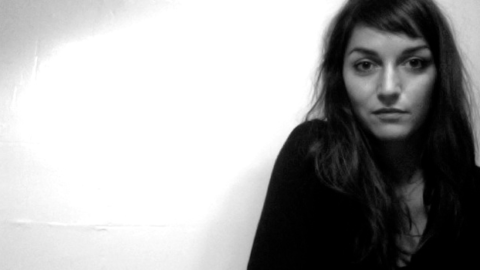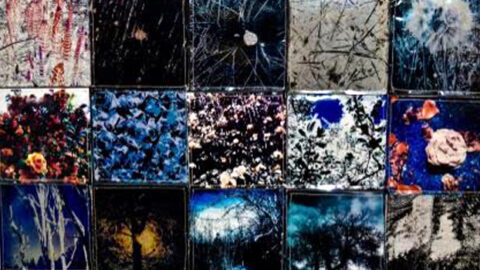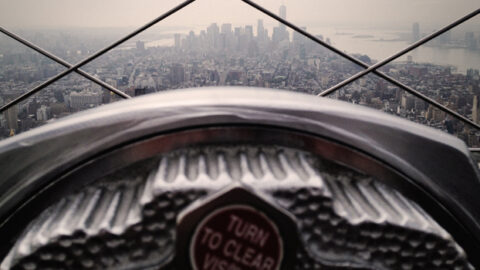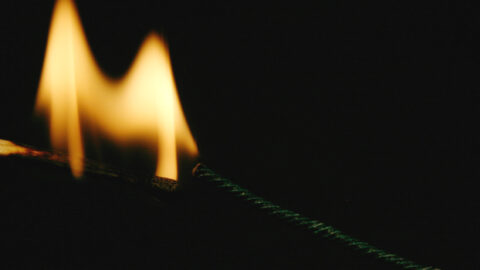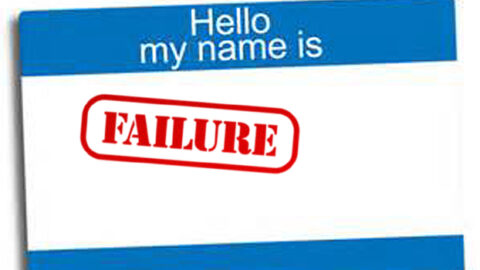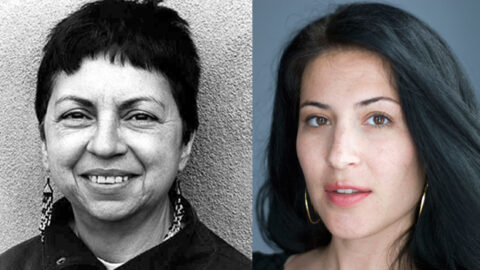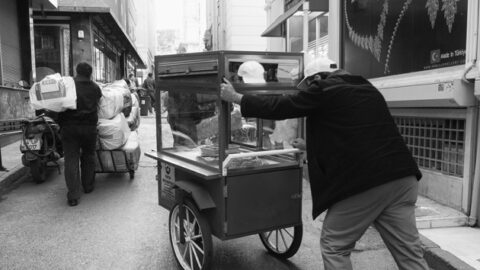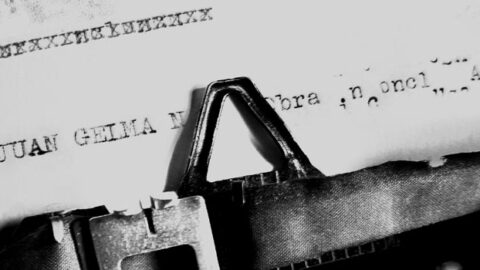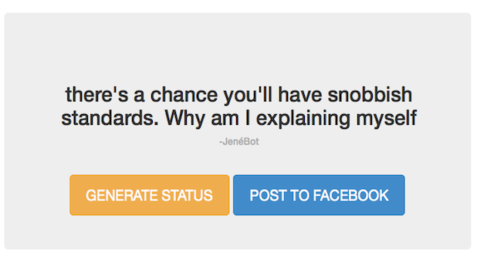Unleashing the Unconscious: Poetry, Place and Neuroscience in the Art of Kuma Kitsune
Above: Detail from Kitsune’s A Walk Through the Looking Glass.
Kuma Kitsune is a mixed-media artist and photographer living in Portland, OR. Her work incorporates a diversity of materials, such as fabric, projection film, tiny shreds of paper — and, in her most recent installment, other people’s poetry. More of her work can be seen here.
E. D. Watson: Your current work, A Walk Through the Looking Glass, is an assemblage of twenty-four individual pieces, titled with fragments of poetry produced by Hafiz, Ray Bradbury, Mary Oliver, Rimbaud and Lewis Carroll, which form a corresponding poem. Viewers are then invited to re-position the works and create their own poem from the new arrangement of the titles. Can you talk a little bit about how literature influences your work, and how you came to select these particular, seemingly disparate, writers?
Kuma Kitsune: I think what most influences my work is the Surrealistic concept of unleashing the unconscious.
In Defense of ‘A Watchman’
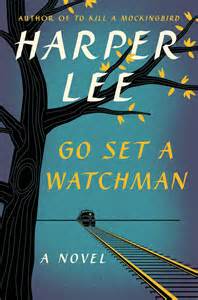 Now that the hoi polloi have had a chance to read Harper Lee’s “new” book, I don’t feel uncomfortable writing about it before most people have had a chance to make up their own minds. (Spoiler alert: those of you still on the waiting list at your local public library, I’m going to talk about the way Lee supposedly shreds the moral fiber of everyone’s favorite dad, a.k.a. Atticus Finch, like a log of string cheese. You probably already know about this though, unless you’ve just awoken from a coma. In which case: Hi. Welcome back. )
Now that the hoi polloi have had a chance to read Harper Lee’s “new” book, I don’t feel uncomfortable writing about it before most people have had a chance to make up their own minds. (Spoiler alert: those of you still on the waiting list at your local public library, I’m going to talk about the way Lee supposedly shreds the moral fiber of everyone’s favorite dad, a.k.a. Atticus Finch, like a log of string cheese. You probably already know about this though, unless you’ve just awoken from a coma. In which case: Hi. Welcome back. )
Catching #FerranteFever
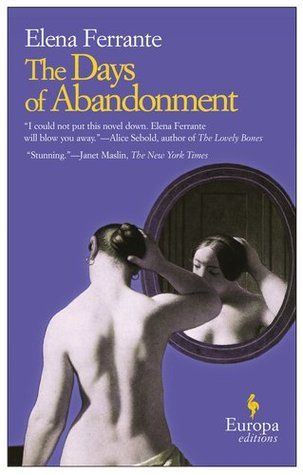 If Italian author Elena Ferrante knows about #FerranteFever, the social media hashtag used by fans to describe their obsession with her books, I’d be willing to bet the phenomenon makes her uncomfortable. Possibly, she’s rolled her eyes about it. That’s because, in this age of selfies and shameless self-promotion, Ferrante is something of an iconoclast, eschewing all public appearances and social media, granting few interviews, and fiercely guarding her true identity (Elena Ferrante is a pen name).
If Italian author Elena Ferrante knows about #FerranteFever, the social media hashtag used by fans to describe their obsession with her books, I’d be willing to bet the phenomenon makes her uncomfortable. Possibly, she’s rolled her eyes about it. That’s because, in this age of selfies and shameless self-promotion, Ferrante is something of an iconoclast, eschewing all public appearances and social media, granting few interviews, and fiercely guarding her true identity (Elena Ferrante is a pen name).
In a rare interview with the author in the spring 2015 issue of the Paris Review, Ferrante declares herself “still very much interested in testifying against the self-promotion obsessively imposed by the media. This demand for self-promotion diminishes the actual work of art, whatever that art may be, and it has become universal.” She then goes on to explain the creative space that opened up for her when she realized that her anonymity would be protected by her publishers. “[It] made me see something new about writing,” she says. “I felt as though I had released the words from myself.”
Behind the Tweet: Memorable moments from AWP 15
I don’t tweet a lot. I hear Facebook is so yesterday, and I only look at Instagram while I’m in the bathroom—but Twitter is supposed to be where it’s at. As a writer, I find it hard to narrow my thoughts down to a mere 140 characters, including hashtags. But at AWP 15 in Minneapolis, I tried to get in on the fun and hit the highlights of my time there.
April 9: “Don’t let anyone consider your poems confessionalist. That’s crap.” –Jan Beatty, #AWP15
I went to “The Poem as a Bodily Thing” panel, where I heard some wonderful thoughts on poems as a, well, bodily thing. This quote by Jan Beatty (who’ve I’ve admired for a long time) definitely struck me. Her point was about sexism and how no one would ever consider a man to be a confessionalist poet. I’m a woman, I’m a poet, and I’ve most-definitely been labeled as confessionalist. Jan is a wise woman.
Apr 9: “It’s time to stop worrying about if people like you. You are grown-ass adults. Time to pack that away.” -@ElissaSchappell Amen! #AWP15
AWP 15: Something for Everyone — And Then Some
I’d been told many times how large AWP would be. Statistics were bandied about (550 panels and readings! 2000 presenters! Over 700 journals!) until the convention became something beyond comprehension. I worked on my schedule for three days before realizing how redundant it was to plan for something so full of activity and opportunity. Go with the flow, the behemoth seemed to demand.
The first of many panels that I saw was the enticingly titled “Sympathy for the Devil: Writing ‘Unlikable’ Characters.” As the name suggests, the panelists were dedicated to explaining why a character that you want to hang out with is not necessarily better than a character you would never want near your children. References as diverse as Humbert Humbert, Bullet in the Brain and the Devil, were supplemented with the panelists’ own readings about white supremacists, violent teenagers and puppy-drowners to create an enthralling mix of discomfort and fascination. Needless to say, it was not a reading for the faint of heart.
Rodney Gomez: 2014 Anzaldúa Poetry Prize Winner
NaNo FAIL; Or, How Cello Lessons Had No Impact on My Ability to Write a Novel
Last November, I posted about how taking cello lessons inspired me to participate for the first time in NaNoWriMo, or National Novel Writing Month. Since then, a lot of people have asked me how the experiment panned out. I’ve been waiting—partly from shame, and partly for the enhanced perspective that is the reward of time—to admit that I failed to produce a complete novel in a single month.
The last few days of November were excruciating. I woke up on November 30th with my inner voice screaming, “You failed! You are a failure! A fail-y, fail-y FAILURE!” Like I’ve said before, my inner voice is a jerk.
Anzaldúa Poetry Prize | 2014 Winners
2015 Pushcart Nominees
We are proud to announce our nominees for this year’s Pushcart Prize:
* David Samuel Levinson for his story, “The Dinner Guest”
* Darrin Doyle for his story, “Engagement”
* Craig Santos Perez for his poems, “From All With Ocean Views”
* Sarah Messer for her poems, “Only Sky Animals,” et al.
* Harrison Candelaria Fletcher for his nonfiction piece, “Artifacts”
* Jennifer Baum for her nonfiction piece, “A Different Set of Rules”
Though selection is never easy, we nominate six writers every year for the Pushcart Prize because we believe in the endeavor of keeping the world reading and writing,
How Cello Lessons Convinced Me to Do NaNoWriMo
There is something liberating about doing a thing you enjoy, even if you know you aren’t doing it well. It feels like skinny-dipping in the town fountain, or giving someone the finger: there’s a defiance, a recklessness to it. If you are a perfectionist, that is.
If you too are a perfectionist, you understand that it goes beyond high personal standards; perfectionism can be crippling. There are loads of things I’ve shied away from because nothing mortifies a perfectionist like a learning curve. We want to be excellent at everything, right from the get-go.
To wit: This was supposed to be The Year I Wrote a Novel. I’d made this promise to myself before; my hard drive is chock-full of false starts. Invariably, somewhere along the way I’d realize what a mess I was making. I knew the middle part, maybe, but not the beginning or the end. “You’re wasting your time,” a little voice inside my head would say. “Stick to short stories! You’ll waste decades of your life writing a stupid novel no one will publish. You’ll be the most embarrassing kind of person in the world: a novelist manqué!”
My inner voice is a jerk.

